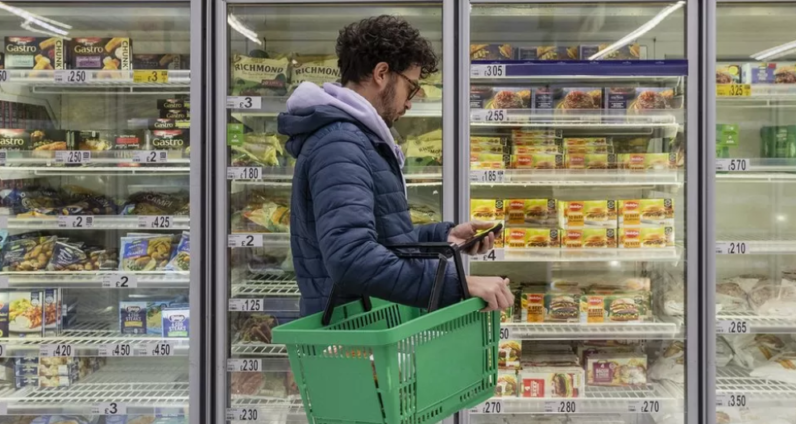The UK economy will shrink and perform worse than other advanced economies as the cost of living continues to hit households, the International Monetary Fund (IMF) has said.
The IMF said the economy will contract by 0.6% in 2023, rather than grow slightly as previously predicted.
However, the IMF also said that after the Autumn Statement it thinks the UK economy is now "on the right track".
Chancellor Jeremy Hunt said the UK outperformed many forecasts last year.
But shadow chancellor Rachel Reeves said the figures showed the UK "lagging behind our peers".
In its World Economic Outlook update, the IMF, which works to stabilise economic growth, said the UK's Gross Domestic Product (GDP) would shrink rather than grow by 0.3% this year.
GDP is a measure for how well, or badly, an economy is doing and in a growing economy, each quarterly GDP figure will be slightly bigger than the quarter before.
If a country's GDP falls for two quarters in a row, it means it is in recession and its economy is doing badly. Typically this means companies make less money and the number of people unemployed rises.
The IMF predicted the UK would be the only country - across the world's advanced and emerging economies - to suffer a year of declining GDP. Even sanctions-hit Russia is now forecast to grow this year.
The IMF said its new forecast reflected the UK's high energy prices and financial conditions, such as high inflation.
IMF chief economist Pierre-Olivier Gourinchas told the BBC that for 2022, the UK had had "fairly robust" growth at 4.1%, which he said was "one of the strongest growth numbers in Europe".
"But it is true that we are forecasting a sharp slowdown in 2023, with growth that would turn even negative for the year."
He said the revision reflected the "fact that we have a very challenging environment in the United Kingdom", which he said was caused by high energy prices as well as "high dependence on liquid natural gas".

The Bank of England has put up interest rates nine times since December 2021 in an attempt to reduce inflation - the rate at which prices rise. Mr Gourinchas said these rate rises fed "quickly into mortgages, because a lot of mortgages are adjustable rates".
"So a lot of homeowners with mortgages are seeing an increase in their mortgage payments."
Mr Gourinchas said another factor in the UK's forecast was that employment was still below pre-pandemic levels.
He said the plans outlined by the Treasury in the months since the Autumn Statement showed the UK was "certainly trying to carefully navigate these different challenges and we think that they are on the right track".
And the IMF said in 2024 it expected the UK economy to grow by 0.9%, up from a previous forecast of 0.6%.
'Heading for recession'
Sophie Lund Yates, senior equity analyst at Hargreaves Lansdown, told the BBC's Today programme the UK was not the only major economy struggling and there was a chance it could "squeak out a little more positivity" than the IMF had predicted.
"The Bank of England's own predictions are slightly brighter than [the IMF's' have been]," she added.
"But overall we are heading for recession and the big question is how deep that's going to be."


Against the backdrop of growing expectations of a milder recession across the world, the IMF's forecasts for the UK stand out, downgraded by just under a full percentage point since the autumn, and now expected to shrink by 0.6% this year.
The IMF attributes this to rapid interest rate rises, tax rises, higher borrowing costs for businesses and still high domestic energy prices. The fund said the UK was having to navigate a very complex environment, and that since the Autumn Statement British policy was now "on the right track".
But if over the coming year this forecast proves to be correct, it raises questions as to why the UK will have missed out on a better global economic backdrop. The UK is now the only shrinking economy out of 15 published in this report.
The Bank of England will publish its new forecast for the UK economy later this week, alongside an expected further rise in interest rates.

The IMF's bleak picture for the UK comes after Mr Hunt warned it was "unlikely" that there would be room for any "significant" tax cuts in the Spring Budget.
The chancellor, who has been under pressure from some in his party to cut taxes to stimulate the economy, has said that lowering inflation "is the best tax cut right now".
Inflation hit 10.5% in the 12 months to December, close to a 40-year high.
Prime Minister Rishi Sunak has pledged to halve inflation by the end of the year, although some economists have said price rises will slow without government policies, due to commodity prices and shipping costs decreasing.
Andrew Bailey, the governor of the Bank of England, has also said inflation is likely to fall rapidly this year but has warned a UK recession is still on the cards.
While the IMF predicts the UK economy will contract, it forecasts economic growth of 1.4% in the US, 0.1% in Germany and 0.7% in France.
Mr Hunt said the IMF's figures "confirm we are not immune to the pressures hitting nearly all advanced economies".
"Short-term challenges should not obscure our long-term prospects - the UK outperformed many forecasts last year, and if we stick to our plan to halve inflation, the UK is still predicted to grow faster than Germany and Japan over the coming years," he added.
Economic forecasters are not always 100% right when it comes to predicting the future. The IMF has said its forecasts for growth the following year in most advanced economies like the UK's have more often than not been within about 1.5 percentage points of what actually happens.
The IMF said the trend of central banks putting up interest rates to try to curb inflation and the war in Ukraine continued to "weigh on economic activity" across the world.
But it said China reopening its economy from Covid restrictions "paved the way for a faster-than-expected recovery" globally.
Overall, the IMF estimated global inflation had passed its peak and would fall from 8.8% last year to 6.6% in 2023 and 4.3% in 2024.
Latest Stories
-
Center for Learning and Childhood Development Director Dr Kwame Sakyi honoured at Ghana Philanthropy Awards
3 hours -
Asantehene receives 28 looted artefacts
4 hours -
CAF WCL 2024: Ghana’s Thelma Baffour wins title with TP Mazembe
4 hours -
Benjamin Boakye slams politicisation of energy sector issues and ECG’s inefficiencies
4 hours -
Erastus Asare Donkor and Dr Neta Parsram win big at 10th Mining Industry Awards
5 hours -
Government is “suppressing information” about power sector challenges – IES Director
5 hours -
Majority of our debts caused by forex shortfall – ECG Boss
5 hours -
Pan-African Savings and Loans supports Ghana Blind Union with boreholes
6 hours -
Bole-Bamboi MP Yussif Sulemana donates to artisans and Bole SHS
6 hours -
Top up your credit to avoid potential disruption – ECG to Nuri meter customers
6 hours -
Dutch & Co wins 2024 Entrepreneur of the Year Award
6 hours -
We’ll cut down imports and boost consumption of local rice and other products – Mahama
9 hours -
Prof Opoku-Agyemang donates to Tamale orphanage to mark her birthday
10 hours -
Don’t call re-painted old schools brand new infrastructure – Prof Opoku-Agyemang tells gov’t
10 hours -
Sunon Asogli plant will be back on stream in a few weeks – ECG
10 hours

